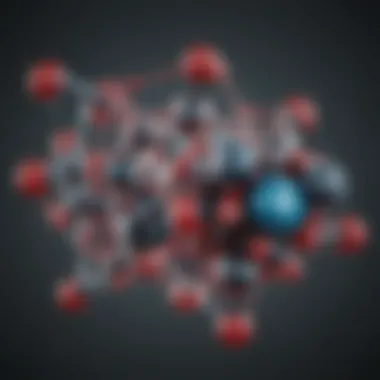Unraveling the Complexities of Alpha Defensin


Intro
Alpha defensin is an important element in the human immune system. These peptides are produced primarily by neutrophils and epithelial cells. They play a critical role in the innate immune response, helping to protect the host from pathogens. Understanding alpha defensin offers insights into its function, significance, and potential for therapeutic applications.
Research Overview
Recent studies have significantly advanced our knowledge of alpha defensin. Key findings demonstrate its ability to disrupt microbial membranes, thus acting as a direct antimicrobial agent. Beyond its antimicrobial activity, alpha defensin also participates in modulating the immune response. This dual functionality underscores its importance in both health and disease contexts.
Summary of key findings
- Alpha defensin can neutralize a range of pathogens, including bacteria, viruses, and fungi.
- It enhances monocyte and macrophage activities, promoting inflammation and wound healing.
- Dysregulation of alpha defensin has been linked to various diseases such as inflammatory bowel disease and certain cancers.
Importance of the research in its respective field
The exploration of alpha defensins can lead to novel therapeutic strategies. Understanding how these peptides function might help in designing drugs that can mimic or enhance their natural activity. This area of research holds promise for improving treatments for infectious diseases and immune-related disorders.
Methodology
The methodologies employed in studying alpha defensins involve both in vitro and in vivo approaches. Researchers utilize various assays to assess the antimicrobial activity and immune-modulating effects of these peptides.
Description of the experimental or analytical methods used
- Cellular assays to evaluate the killing effects on different types of bacteria.
- In vivo models to study the effects of alpha defensins in disease settings.
- Biochemical techniques to analyze structural properties.
Sampling criteria and data collection techniques
Sampling often involves human tissues or cell lines that are relevant to immune responses. Techniques like flow cytometry and ELISA are widely used to quantify alpha defensin levels and assess immune activation.
"Continued research into alpha defensins may unlock new pathways for tackling persistent infections and inflammatory diseases."
This comprehensive exploration signifies the potential for alpha defensins to influence medical research considerably. The knowledge gained from studying these peptides can pave the way for innovative therapeutic applications.
Prolusion to Alpha Defensin
The exploration of alpha defensin is essential in understanding its role in the immune system and its potential applications in medical science. Alpha defensins are small cationic peptides, crucial for innate immunity. Their presence in various tissues and fluids indicates their functionality in protecting the organism from pathogens. This article aims to take a closer look at these peptides, underscoring their biological significance and relevance in health and disease.
Definition and Overview
Alpha defensins are part of a larger family known as defensins, which are antimicrobial peptides produced by various cells in the body. They are primarily found in neutrophils and Paneth cells of the intestine. Structurally, alpha defensins are known for their small size and poor solubility, yet their antimicrobial properties are potent. They function by disrupting the membranes of bacteria, viruses, and fungi, leading to cell lysis. This helps to form a crucial line of defense against infectious agents.
Historical Context
The study of alpha defensins dates back to the late 20th century when researchers began to isolate and characterize these peptides. The first alpha defensins were linked to the innate immune defense mechanisms, leading to a broader characterization of the defensin family over the years. Significant advancements in molecular biology and biochemistry have enabled scientists to study their roles in human health, revealing their contribution to processes such as wound healing and inflammation. Understanding their historical development aids in recognizing the importance of continued research in this stimulating field.
Biochemistry of Alpha Defensin
The biochemistry of alpha defensin presents a foundational aspect of understanding its role in immune function and health. These peptides are essential not only for antimicrobial defense but also for modulating immune responses. Their unique structure and synthesis processes highlight the complexity of biological mechanisms that contribute to host defense. An exploration of their biochemistry provides insights into potential therapeutic applications and underscores their relevance in modern medical research.
Structure and Classification
Alpha defensins are small cationic peptides, typically ranging between 18 to 45 amino acids in length. Their defining characteristic is the presence of six conserved cysteine residues that form three disulfide bonds, granting them a stable and compact structure. This specific arrangement contributes to their ability to disrupt microbial membranes, which is a crucial aspect of their antimicrobial activity.
Alpha defensins are classified into two main groups based on their sources: human defensins and mammalian defensins. Human defensins are further divided into alpha and beta defensins. Alpha defensins, primarily expressed in neutrophils and Paneth cells, play vital roles in early immune response. The classification hinges on structural features and the pattern of disulfide bonding.


Key characteristics include:
- Cationicity: This property enables alpha defensins to interact effectively with negatively charged microbial surfaces.
- Hydrophobic regions: These facilitate membrane insertion, aiding in the disruption of pathogen integrity.
- Broad-spectrum activity: Alpha defensins can target bacteria, viruses, and fungi, making them a versatile component of the immune response.
Synthesis and Secretion
The synthesis of alpha defensins occurs primarily in the bone marrow and intestines. They are produced as inactive precursors known as pro-defensins. The conversion to active forms involves proteolytic cleavage, primarily catalyzed by enzymes like trypsin.
In terms of secretion, alpha defensins are released in response to microbial exposure. Neutrophils, upon activation, undergo degranulation, which leads to the release of these peptides into the extracellular space. Similarly, Paneth cells secrete them into the gut lumen, where they contribute to maintaining intestinal homeostasis.
The secretion of alpha defensins follows specific regulatory mechanisms. Factors influencing their release include:
- Microbial presence: The detection of pathogens leads to an increase in defensin gene expression.
- Cytokine signals: Local immune responses trigger the secretion of alpha defensins, enhancing antimicrobial defense.
Overall, the biochemistry of alpha defensin encapsulates a rich interplay of structure, synthesis, and function. Understanding these elements informs both theoretical and practical applications in immunology and therapeutic development.
Mechanisms of Action
Understanding the mechanisms of action of alpha defensins is critical in comprehending their role in the immune response. These small peptides are part of the innate immune system, acting as first responders against pathogens. Their effectiveness can be attributed to several specific elements, including their antimicrobial properties and the way they enhance the immune response.
Antimicrobial Activity
Alpha defensins exhibit a strong antimicrobial activity. They work by disrupting the membranes of bacteria, fungi, and viruses. This action is primarily due to their unique cationic and amphipathic nature. The positive charge allows them to bind effectively to the negatively charged membranes of pathogens. Once bound, they create pores or disrupt the lipid bilayer, leading to cellular content leakage. This mechanism is crucial in preventing the establishment of infections, particularly in the mucosal surfaces, where many pathogens enter the body.
In addition to direct membrane disruption, alpha defensins can also modulate bacterial physiology. They have been shown to inhibit biofilm formation, which many pathogenic bacteria use to shield themselves from the immune system and antibiotics. Recent studies suggest that alpha defensins can also bind to lipopolysaccharides, further reducing the virulence of certain bacteria.
Role in Innate Immunity
The role of alpha defensins in innate immunity extends beyond their direct antimicrobial effects. They are also involved in signaling pathways that activate other immune cells. When released, defensins can attract immune cells, such as neutrophils and monocytes, to sites of infection. This recruitment is essential for a robust immune response, ensuring that pathogens are eliminated by various immune mechanisms.
Moreover, alpha defensins can enhance the adaptive immune response. They have been recognized to influence antigen presentation, which enables T cells to recognize pathogens more effectively. This interaction highlights their importance not only in the early stages of an immune response but also in shaping the long-term immunity against infections.
"Alpha defensins play a pivotal role in orchestrating the immune response, acting as both antimicrobial agents and modulators of immune cell activities."
Alpha Defensins in Human Health
Alpha defensins play a significant role in maintaining human health due to their multifunctional properties in the immune system. These small peptides not only exhibit antimicrobial properties but also contribute to various physiological functions essential for homeostasis. Their presence in tissues and biological fluids highlights their importance in both defense mechanisms and potential therapeutic applications.
Defensins and Physiological Functions
Defensins are crucial in various physiological processes within the human body. They are key players in the innate immune response, acting as the body’s first line of defense against pathogens.
- Antimicrobial Activity: Defensins possess the ability to disrupt microbial cell membranes, leading to cell lysis. This activity protects against a wide array of pathogens, including bacteria, fungi, and some viruses.
- Modulation of Immune Response: Beyond direct antimicrobial actions, alpha defensins can influence the functions of immune cells. They are known to attract immune cells, such as neutrophils and monocytes, to sites of infection and inflammation. This recruitment is vital for an effective immune response.
- Wound Healing: There is evidence indicating that defensins also contribute to the process of wound healing by promoting cellular migration and proliferation. This function is important for restoring tissue integrity following injury.
Overall, the biological functionality of alpha defensins extends beyond their antimicrobial properties, encompassing roles in inflammation, tissue repair, and immune regulation. This variety of functions underscores their importance in overall health.
Defensins in Disease Mechanisms
While alpha defensins are protective, their dysfunction or alterations in expression can be associated with various diseases.
- Infections: Lower levels of alpha defensins are often observed in individuals with certain chronic infections. This deficiency can impair the ability to fend off invaders, leading to persistent or recurrent infections.
- Autoimmune Diseases: In conditions like inflammatory bowel disease, altered defensin production has been documented. It suggests that the dysregulation of defensins may contribute to the pathogenesis of these diseases by failing to maintain epithelial barrier integrity.
- Cancer: Studies are beginning to uncover the role of alpha defensins in cancer. Some research indicates they may have dual roles, potentially hindering tumor progression or, conversely, promoting cancer cell growth in specific contexts.
In these instances, the understanding of alpha defensins in human health extends into intricate relationships between defense mechanisms and the development of disease. Addressing these correlations may lead to novel insights in medical research, paving the way for targeted therapeutic strategies.


"Alpha defensins can illuminate our understanding of immune functions and disease mechanisms, offering a pathway for novel clinical applications."
Recognizing the interplay between alpha defensins and health is essential for advancing both preventative and therapeutic healthcare measures.
Clinical Significance of Alpha Defensin
Alpha defensins play a crucial role in both diagnostic and therapeutic contexts within the medical field. Their distinctive properties as antimicrobial peptides position them as vital indicators in various disease states. Understanding their clinical significance can inform future research and possibly guide the development of novel therapeutic strategies. The exploration of alpha defensins is not only essential to grasp their biological importance but also to comprehend their potential as biomarkers and in targeted therapies.
Biomarkers in Disease
Alpha defensins have emerged as significant biomarkers in the diagnosis and prognosis of several diseases. High levels of these peptides in bodily fluids may serve as indicators of immune response or disease presence.
- Inflammatory Markers: Research has revealed that alpha defensins can reflect inflammatory states in patients suffering from conditions like inflammatory bowel disease and rheumatoid arthritis. High concentrations often correlate with disease activity.
- Diagnostic Applications: For example, alpha defensins have been studied as biomarkers in colitis. In particular, human alpha defensin 2 has proven effective in diagnosing ulcerative colitis, enhancing the accuracy of clinical assessments. This highlights their role in providing objective metrics for disease assessment.
- Infectious Disease: In instances like infections, increased levels of alpha defensins are characteristic. Thus, measuring these levels can aid clinicians in tracking disease progression, understanding immune responses, and tailoring treatment strategies.
The use of these peptides as biomarkers is a promising direction in the medical research field. As our understanding deepens, alpha defensins could enhance diagnostic accuracy and lead to personalized medicine approaches.
Therapeutic Applications
The therapeutic potential of alpha defensins extends beyond their use as biomarkers. These peptides exhibit diverse functions that are being harnessed in various clinical applications.
- Antimicrobial Therapies: Their inherent antimicrobial properties facilitate the development of new antibiotics. Given the rising concern of antibiotic resistance, peptides like alpha defensins offer an alternative approach to combat infections. They target a range of pathogens, including bacteria, fungi, and viruses, making them versatile candidates for therapeutic use.
- Wound Healing: Alpha defensins are known to contribute to wound healing processes. Their role in promoting cellular recruitment and modulating inflammatory responses could provide new avenues for treating chronic wounds or improving surgical recovery outcomes.
- Cancer Treatment: Emerging studies suggest that alpha defensins may influence tumor growth and metastasis. Their modulatory effects on the immune system open potential applications in oncology, helping to enhance immune responses against tumors.
Alpha defensins can potentially change the landscape of modern medicine, providing tools for not only diagnosis but also as effective therapeutic agents.
Alpha Defensins in Infectious Diseases
Alpha defensins play a crucial role in the defense against infectious diseases. These small peptides are integral to the immune response, particularly in combating pathogens. Their significance is heightened in the context of viral and bacterial infections. Numerous studies have linked alpha defensins to enhanced resistance against various infections, indicating their potential as therapeutic agents.
Defensins Against Viral Infections
In the realm of virology, alpha defensins are increasingly recognized for their ability to inhibit viral replication. They achieve this through various mechanisms, including direct interaction with viral particles and modulation of host cell responses. The peptidic structure of alpha defensins allows them to bind to viral envelopes, neutralizing the virus and preventing cell entry.
Research has shown that alpha defensins can affect a broad range of viruses. For example, studies demonstrate their effectiveness against human immunodeficiency virus (HIV) by preventing its attachment and penetration into target cells. Additionally, alpha defensins have shown potential against influenza viruses, contributing to the overall antiviral immune response. This ability makes them a focal point for potential therapeutic approaches aimed at enhancing host defense mechanisms against viral pathogens.
Role in Bacterial Infections
Alpha defensins also demonstrate robust activity against bacterial infections. These peptides exhibit a broad spectrum of antimicrobial properties, targeting various gram-positive and gram-negative bacteria. Their action primarily involves disruption of bacterial membranes. By inserting themselves into lipid bilayers, alpha defensins create pores that lead to cellular leakage and death of the bacteria.
The importance of alpha defensins in bacterial infections is highlighted by their involvement in the innate immune response. They are produced by various immune cells, including neutrophils and macrophages, and are released at sites of infection. This timely response is critical for containing bacterial growth and preventing systemic spread.
Moreover, their role extends beyond mere antibacterial action. Alpha defensins can modulate inflammatory responses and enhance the recruitment of immune cells to sites of infection. Their multifaceted function makes them vital to maintaining the balance in immune homeostasis during bacterial challenges.
Research Advances and Future Directions
The area of alpha defensin research has evolved significantly over recent years, driven by the increasing recognition of its vital roles in the immune response and potential clinical applications. Understanding these advances is crucial not just for academic inquiry, but for their implications in real-world health scenarios. Clinicians and researchers alike benefit greatly from keeping abreast of these developments, which may one day translate into new therapies or diagnostic tools.
Recent Studies on Alpha Defensins
Recent research has delved into various aspects of alpha defensins, providing insights into their complex mechanisms and applications. For instance, studies have demonstrated that alpha defensins not only exhibit antimicrobial properties but also function as signaling molecules.
- Functional Diversity
- Mechanistic Insights
- Clinical Relevance
- Investigations highlight that alpha defensins play a role in modulating the immune response rather than simply acting as antimicrobial agents.
- They can attract immune cells to sites of infection, thus suggesting a multifaceted role in immune regulation.


- Some studies focus on understanding how these peptides interact with different pathogens. Research shows variations in effectiveness against bacteria, viruses, and fungi, hinting at the evolutionary adaptability of defensins.
- Recent clinical trials have explored the potential of alpha defensin levels as biomarkers for various diseases. A notable error noted in previous studies, where levels were not adequately correlated with disease activity, has been addressed in newer methodologies.
These studies contribute to a more comprehensive image of how alpha defensins operate in health and disease contexts, pointing toward their potential as a diagnostic tool or therapeutic target.
Potential for Genetic and Pharmacological Modulation
The future of alpha defensins research holds promise, particularly in the areas of genetic manipulation and pharmacological approaches. Understanding how to enhance or modulate the activity of alpha defensins could present exciting therapeutic opportunities.
- Genetic Engineering
- Pharmacological Innovations
- Advances in gene editing technologies, such as CRISPR-Cas9, offer avenues for tailored modulation of defensin genes. This could lead to enhanced expression in individuals with weakened immune responses.
- Investigating small molecules that can boost defensin expression or mimic their function poses an intriguing area for drug development.
- Current research is evaluating compounds that can stabilize defensin actions or expand their antimicrobial spectrum.
As these approaches mature, they provide a framework for developing innovative treatments that harness the capabilities of the immune system.
"The modulation of alpha defensins could redefine therapeutic strategies across various diseases, offering not just symptom management, but potentially curative pathways."
As we move forward, it becomes increasingly crucial to examine both ethical implications and safety profiles for these potential treatments. With ongoing research, the integration of alpha defensins into personalized medicine may emerge, further emphasizing their relevance in current scientific and medical discussions.
Ethical Considerations in Alpha Defensin Research
Research on alpha defensin brings up several ethical considerations that are crucial to address. As scientists increasingly explore the potential of these peptides in medicine and therapy, it is essential to evaluate the ethical implications of such research deeply. This includes how human and animal subjects are treated and the consequences of findings in clinical applications.
Ethical Implications of Defensin Studies
There are multiple ethical dimensions intertwined within alpha defensin research. First, understanding that alpha defensins are present in humans leads to the necessity of informed consent in studies involving human participants. Researchers must ensure that individuals understand the purpose and potential risks of studies involving these biomolecules. This is particularly important given the biological complexity and the potential for unintended consequences in modulation of immune responses.
Additionally, the use of animal models to assess the efficacy and safety of alpha defensins raises ethical concerns. Researchers must adhere to guidelines for humane treatment of animals. The principle of the 3Rs—replacement, reduction, and refinement—should govern study designs. This means finding alternatives to animal testing when possible, minimizing the number of animals used, and refining methods to cause less suffering.
"Ethical research should align with moral principles, ensuring welfare of all subjects involved."
Engagement with ethical review boards is necessary to scrutinize research protocols and ensure they meet established ethical standards. Transparency in methods and findings builds trust between the scientific community and the public.
Regulatory Challenges
Navigating the regulatory landscape of alpha defensin research poses significant challenges. Due to the rapid advancements in biotechnology and genetic engineering, regulatory frameworks often lag behind scientific progress. This is particularly true in evaluating new treatments involving alpha defensins, where standards for safety and efficacy may not be clearly defined.
Researchers must work closely with regulatory agencies, such as the Food and Drug Administration (FDA) in the United States, to ensure compliance with guidelines that govern clinical trials. Such trials often require extensive documentation of the safety and side effects of any investigational therapy based on alpha defensins.
Moreover, as alpha defensins potentially cross lines into gene therapy or personalized medicine, researchers need to address concerns regarding long-term impacts on human health and ecosystem balance. The regulatory dialogue must adapt dynamically to encompass the innovative applications of alpha defensins while ensuring public safety and ethical governance.
Closure
The emphasis on alpha defensin takes center stage in understanding its multifaceted role in human health and disease. This article outlines various aspects of alpha defensin, from its biochemistry to its clinical implications. The analysis reveals significant findings that connect its physiological roles to broader health outcomes, underscoring alpha defensin as an essential component in the immune response.
Summary of Key Points
- Biochemical Structure: Alpha defensins are small peptides characterized by their unique structure that enables them to interact with microbial membranes, facilitating their antimicrobial properties.
- Mechanisms of Action: Their ability to disrupt the membranes of pathogens underlines their importance in innate immunity. This activity not only protects against infection but also promotes healing.
- Clinical Significance: Alpha defensins can serve as valuable biomarkers for various diseases. Their levels may indicate inflammatory responses, thus potentially guiding therapeutic strategies.
- Research Advances: Recent studies suggest that enhancing or modulating the expression of alpha defensins may have significant therapeutic applications, especially in infectious diseases such as HIV and tuberculosis.
- Ethical Considerations: Research into alpha defensin raises important ethical questions about genetic manipulation and regulatory standards that need careful deliberation.
"Understanding alpha defensins not only is critical for immunology but also has broad implications across various fields of medicine."
Final Thoughts on Future of Alpha Defensin
Moving forward, the trajectory of alpha defensin research presents exciting prospects. Studies indicate that further exploration into genetic modifications could enhance their production or enable targeted therapeutic applications. Such breakthroughs hold promise for developing new strategies against infectious diseases and inflammatory conditions.
Moreover, as science evolves, understanding the interactions of alpha defensins with other immune components will become crucial. This holistic approach may allow researchers to manipulate these peptides for better clinical outcomes in disease prevention and treatment.







